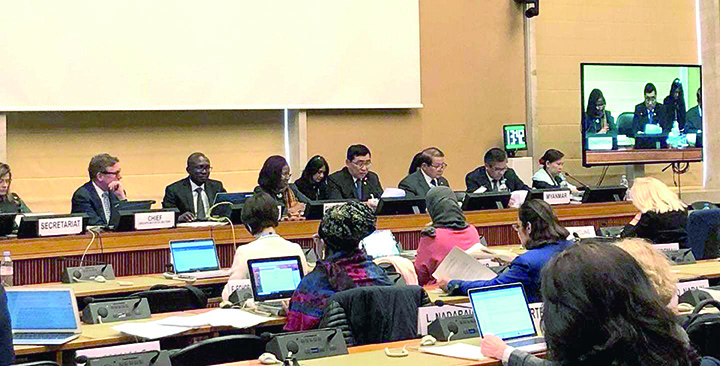24 February
The constructive dialogue between Myanmar and the Committee on the Elimination of Discrimination against Women (CEDAW) on the Exceptional Report submitted by Myanmar at the latter’s request was held on 22 February 2019 during the 72nd Session of CEDAW in Geneva, Switzerland.
The Myanmar delegation was headed by Dr. Win Myat Aye, Union Minister for Social Welfare, Relief and Resettlement. The delegation includes representatives from the Ministry of Foreign Affairs, the President’s Office, the Ministry of Home Affairs, the Ministry of Defence, the Ministry of Social Welfare, Relief and Resettlement and the Union Attorney’s General Office as well as the Permanent Mission of Myanmar in Geneva.
Union Minister, in his opening remarks, stressed that the reason of Myanmar delegation’s visit led by Union Minister himself, who is taking a leading role on Women’s rights, was a testimony of the Government’s cooperative contribution to the work of CEDAW and that Myanmar as a responsible member of CEDAW submitted the Exceptional Report to the Committee, and Myanmar is a society in which women enjoy equal rights with men in every aspect.
Union Minister further mentioned that Myanmar is currently in the best of times and also in times of facing challenges. The best is that the country is undergoing a transition from half-a-century-long military rule to a democratic state, whereas the bigger challenges are the people’s hopes highly placed on the Government and the responses of the international community when the Government inherited the internal conflict, deep-rooted backwardness, lack of human resources and efficient institutions. The issue in northern Rakhine State has hindered the Government’s efforts. Notwithstanding those challenges, Myanmar is now striving to ensure that democracy takes firm root, although this process takes time. Rights of women and girls in northern Rakhine State have also become the focus of international attention.
However, he added that the Government took important measures making every effort to protect and promote rights of all women and girls, residing in the country. The Government restructured the Myanmar National Committee on Women and implemented a national mechanism with the inclusion of seven leading local non-governmental and civil society organizations that are very active in gender equality and women empowerment issues.
He said that to strengthen legal protection for women, the “Prevention and Protection of Violence Against Women Law” has also been drafted. In addition, the Government signed the Joint Communique with the United Nations to prevent and respond to conflict-related sexual violence in Myanmar on 7 December 2018. On 7 January 2019, the Government formed a Committee on the Prevention of Grave Violations against Children in Armed Conflict, with the representatives from the Ministry of Home Affairs and Defence.
Many specific porgrammes have been carried out for the socio-economic development of women and girls in Rakhine State. The Government has prioritized social-cohesion in implementing the recommendations of the Advisory Commission on Rakhine State.
Union Minister informed that the Independent Commission of Enquiry (ICoE) was established to investigate allegations of human rights violations and related issues following the terrorist attacks by ARSA with a view to seeking accountability and formulating recommendations on steps to be taken to ensure peace and stability in Rakhine State. The ICoE has recently launched its Call for Submissions, inviting those with evidence and supporting data related to allegations of human rights violations in Rakhine, to come forward and submit them for further action.
He emphasized that when building a Democratic Federal Union in Myanmar, the rights of all people regardless of race, religion, gender and disabilities will be respected in accordance with the Union Accord. The Union Minister suggested that the international community best assist Myanmar by rendering constructive engagement and positive support, by taking into account both international best practices and the local realities.
During the dialogue, the Permanent Representative of Myanmar and the representatives from the line Ministries responded to the related questions posed by the members of CEDAW Committee and they exchanged views on measures taken by the Government of Myanmar. In the closing remarks, the Myanmar delegation welcomed the constructive dialogue, which represented an important day in the history of cooperation between Myanmar and the Committee. The Myanmar delegation stressed that there was a gap between the Committee’s perceptions and the realities on the ground; and Myanmar could not accept some questions raised by some members of the Committee as they were based on allegations with no concrete evidence and the exaggerations; despite all the challenges, Myanmar has been working towards the rule of law, stability, sustainability and social harmony in Rakhine State.—MNA


